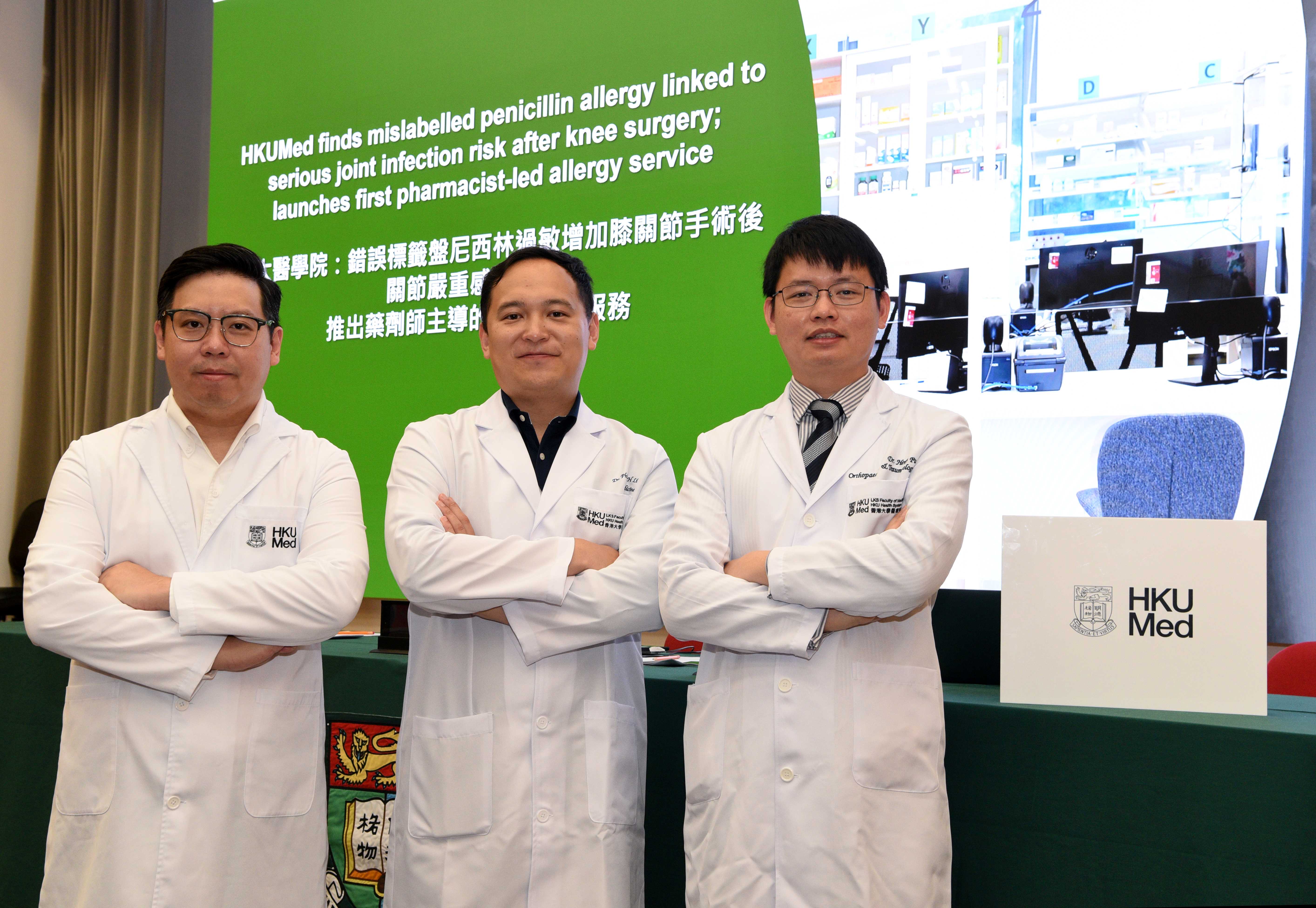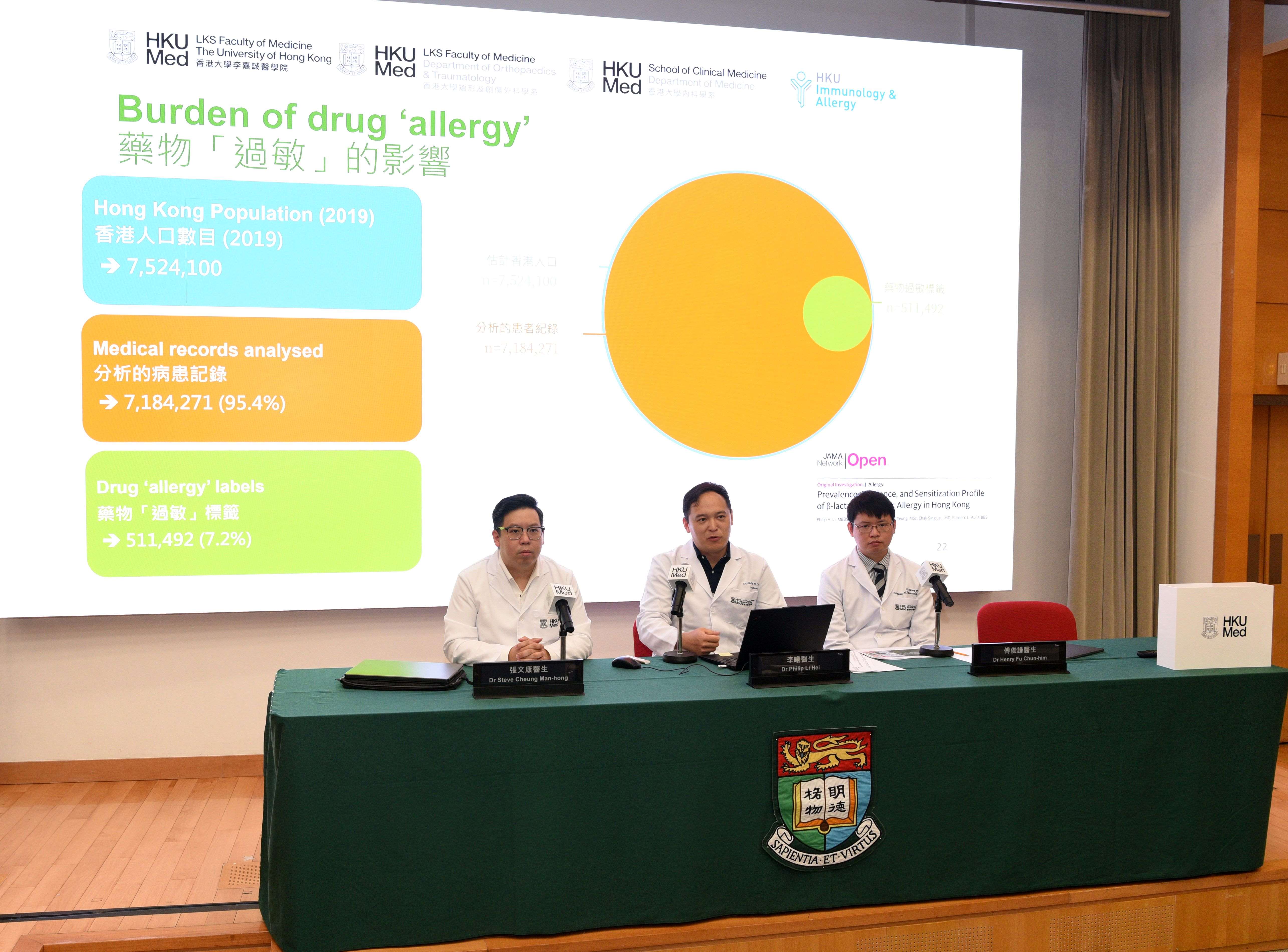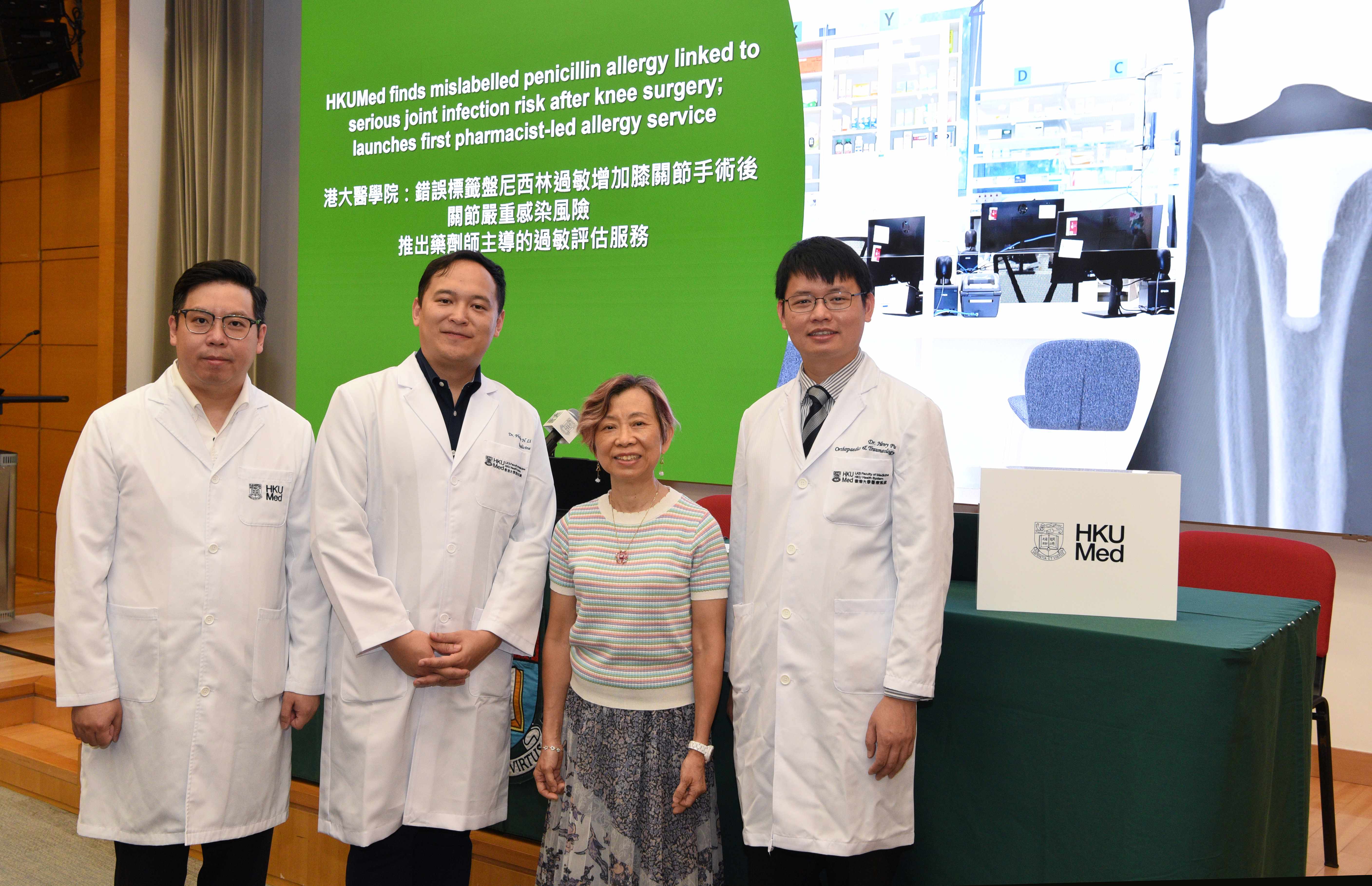20 August 2025
A research team led by the Department of Medicine and the Department of Orthopaedics and Traumatology, under the School of Clinical Medicine, LKS Faculty of Medicine of the University of Hong Kong (HKUMed), has uncovered a serious risk of joint infection following knee surgery, linked to allergy mislabelling. The study showed that patients incorrectly labelled as allergic to penicillin or other beta-lactam (BL) antibiotics face a significantly higher chance of developing periprosthetic joint infection (PJI) — a painful and costly infection that can arise following joint replacement surgery, which can also lead to major complications. This revelation has prompted the launch of Hong Kong's first research-focused pharmacist-led pilot service for penicillin allergy assessment at HKUMed, aimed at addressing this critical healthcare issue. The research, underscoring the importance of accurate allergy documentation, was published in The Bone & Joint Journal [link to publication].
A hidden danger: 90% of allergy records are incorrect
Penicillin and related BL antibiotics are among the most effective medicines for treating bacterial infections. However, patients who are labelled as allergic often receive alternative medications that are less effective and carry greater risks. In Hong Kong, about 2% of the population, over 140,000 people, are recorded as having a penicillin or BL allergy. Alarmingly, previous studies have found that up to 90% of these allergy labels are incorrect, leaving many patients at risk of receiving less effective and potentially harmful treatments.
Dr Philip Li Hei, Division Chief of Rheumatology & Clinical Immunology and Clinical Assistant Professor from the Department of Medicine under the School of Clinical Medicine at HKUMed, explained: ‘Many of these incorrect allergy labels were documented in patients’ medical records decades ago — perhaps based on childhood reactions such as a rash, or on inappropriate skin tests done outside Hong Kong. Unfortunately, these outdated records prevent patients from receiving optimal care, particularly when it comes to critical surgeries like knee replacements.’
Mislabelled allergies triple the infection risk in knee replacements surgery
The research team analysed over 4,700 knee replacement procedures performed at Queen Mary Hospital between 1993 and 2021 and found the patients identified as having penicillin allergy were three times more likely to develop an infection. More importantly, the presence of a penicillin allergy label was identified as an independent risk factor for PJI, increasing the likelihood of infection by nearly fivefold. This heightened risk is associated with a range of adverse outcomes, including mandatory use of second-line antibiotics, longer hospital stays, increased mortality, higher healthcare costs, and the development of multidrug-resistant organisms.
‘This study provides the first large-scale evidence from Hong Kong showing the serious consequences of mislabelled penicillin allergies,’ said Dr Steve Cheung Man-hong, Honorary Clinical Assistant Professor in the Department of Orthopaedics and Traumatology under the School of Clinical Medicine at HKUMed. ‘These infections are not only painful and life-threatening, they also necessitate additional surgery and long-term antibiotic treatment, and place a heavy burden on our healthcare system.’
New service for safer patient outcomes
To address the urgent need for better drug allergy assessments, HKUMed has launched a new research-focused pharmacist-led penicillin allergy assessment pilot service. This service allows patients to directly access expert evaluations at the research-based HKU Community Pharmacy without requiring a prior referral from a doctor. Specially trained pharmacists will conduct initial assessments, and if further evaluation is required, patients can be seamlessly referred to an allergist — all within a coordinated and integrated care pathway.
This streamlined and accessible approach not only improves patient care but also helps reduce the burden on hospital-based allergy clinics, which are often overwhelmed by high demand. By empowering pharmacists to play a central role in identifying and managing mislabelled allergies, HKUMed's initiative sets a new standard for community-based allergy care in Hong Kong.
‘This initiative is not just about correcting a label,’ said Dr Philip Li Hei. ‘It's about ensuring that patients receive the safest and most effective care possible. Our pharmacist-led model makes allergy evaluation more accessible and efficient, especially for patients who urgently need antibiotics, such as those awaiting surgery.’
Ensuring optimal care: A commitment to patient
‘Our goal is to ensure that every patient enters surgery with the safest and most effective treatment plan available,’ said Dr Henry Fu Chun-him, Division Chief of Joint Replacement Surgery and Clinical Assistant Professor in the Department of Orthopaedics and Traumatology under the School of Clinical Medicine at HKUMed. ‘Correcting inaccurate allergy labels is a simple yet important step that can make a big difference in patient outcomes.’
HKUMed encourages the public to review their medical records, particularly if they have unverified penicillin allergy labels. With proper testing, many patients can safely receive first-line treatments that provide offer better protection against infections.
About the research team
This interdisciplinary study was led by Dr Philip Li Hei, Clinical Assistant Professor, Department of Medicine, and Dr Steve Cheung Man-hong, Honorary Clinical Assistant Professor, Department of Orthopaedics and Traumatology, both from the School of Clinical Medicine, HKUMed. The research team also included Dr Valerie Chiang from Queen Mary Hospital; and Dr Henry Fu Chun-him, Dr Amy Cheung Yim-ling, Professor Peter Chiu Kwong-yuen and Dr Michelle Luk, from the Department of Orthopaedics and Traumatology, School of Clinical Medicine, HKUMed.
Media enquiries
Please contact LKS Faculty of Medicine of The University of Hong Kong by email (medmedia@hku.hk).




Follow HKUMed